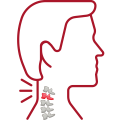Neck Pain
Neck Pain
Neck Pain Treatment in Chennai

Neck Pain
Radiating pain from the neck can spread to one or both arms. Neck pain can be caused by various disorders or diseases involving any of the tissues occurring in the neck, including the nerves, bone, joints, ligaments, and muscles.
Symptoms of Neck Pain-
- As a result of nerve compression, you feel pain in your arm.
- The fingers or arms, or legs may feel weak, numb, burning, or tingling.
- Loss of neck mobility resulting in reduced head movement
- Muscle stiffness in the neck
Note: There are also other diseases with similar symptoms. Having a thorough physical examination performed by your doctor is, therefore, the best option.
Causes of Neck Pain –
- Muscle strains
- Osteoarthritis
- Osteoporosis
- Rheumatoid arthritis
- Nerve compression
- Certain Diseases
- Extra weight
- Stress
- Trauma or injury
- Age Factor
Risk factors for developing neck pain include:
- Older people
- Having a weight problem
- Stress-related mental illness
- Exercising vigorously
- Neck Pain Is More Common in Women
- Long-distance driving or travel
- Computer work that takes up a lot of time
- Looking down too much at your phone or hunching your neck down often
- Strapping heavy bags to your shoulders
- Sleeping poorly due to poor alignment
Prevention of Neck Pain:
- Correct your posture
- Sitting in an ergonomically correct position
- Be a good phone user
- Don’t neglect the weight you carry
- Invest in a comfortable pillow
- How You Sleep Is Important
- Frequently take a break
- Put your armrests to good use
- Smoking should be avoided
Neck Pain Diagnosis: How Is it Done?
- Your doctor will conduct an examination and a detailed medical history.
- Your doctor will evaluate your neck pain based on your medical history
- Your Doctor May Ask You To Do Some Certain Physical Activity to Examine whether your pain is related to muscle, joint or ligaments.
- Your doctor may recommend imaging tests to learn more about your Nerves and Muscles and rule out conditions (such as infections, fractures, and tumours). The following tests may be conducted:
- X-rays
- MRI Scan
- CT Scan
- Nerve Conduction Study
- EMG (Electromyography)
- Blood tests
Treatments for Neck Pain-
Conservative treatment and self-care may include-
- Pain relievers that are sold over-the-counter (OTC)
- Alternating between heat and ice packs
- Taking care of your posture
- Massage your neck gently.
- Resuming normal activities without heavy lifting
- Exercises that stretch and strengthen the neck
- Take a rest
- It would be best if you didn’t cradle the phone between your ear and your shoulder.
- If your doctor does not advise you to use a neck brace or collar, don’t use one. It is possible to make your symptoms worse by not using them correctly.
- Frequently switch positions. Don’t sit or stand still for too long.
Six to eight weeks of conservative treatment may be required.
Medications
If the pain or inflammation is too intense, the Doctor may prescribe a medication to relieve it. Often, this involves anti-inflammatory medication, such as ibuprofen (Advil Motrin Naprosyn Aleve). Acetaminophen Tylenol and other pain relievers may also be recommended. Antidepressants and muscle relaxers may be helpful. Infections may require antibiotics.
Injections
- When the shoulder is affected by arthritis, local corticosteroid injections can often help. A cervical epidural steroid injection may occasionally be needed.
- Cervical Facet Joint Injection / RF Ablation
Surgery
Surgical procedures are sometimes required for nerve roots and spinal cord injuries. You may be recommended to a Surgeon to discuss the surgery by your Physician, depending upon your condition. The last resort is often surgery.
Types of Treatments for Neck Pain
Find the best support for all Your Pain Concerns



